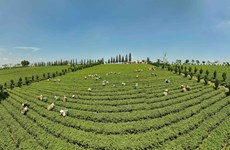Vietnam-UK trade, investment ties expected to boom
The year of 2011 will see a boom in trade and investment cooperation
activities between Vietnam and the UK, the trade counsellor of the
Vietnamese Embassy in the UK and North Ireland has said.
The year of 2011 will see a boom in trade and investment cooperation
activities between Vietnam and the UK, the trade counsellor of the
Vietnamese Embassy in the UK and North Ireland has said.
An The Dung has a reason to make the remark as two-way trade turnover between the two countries is estimated to record an impressive growth rate of 15 percent this year, particularly in the context of unstable economic situation in many other countries.
Dung said the bilateral ties between Vietnam and the UK have been developing rapidly over recent years, adding the signing of a joint statement of promoting the two countries’ relationship as strategic partnership in September this year is a boost to their cooperation comprehensively, particularly in some key areas, including trade and investment.
According to Dung, two-way trade turnover in the first 10 months of 2010 increased by 18.6 percent to 1.3 billion GBP, exceeding the whole last year’s record of 1.26 billion GBP.
In the first ten months of 2010, the UK imported from Vietnam 1.03 billion GBP worth of commodities and exported to the Asian country 235.8 million GBP, year-on-year increases of 15 percent and 37.7 percent, respectively. In the two remaining months, the two-way trade turnover is expected to add 200 million GBP more to bring the year’s figure to 1.5 billion GBP (2.4 billion USD).
The EU country imports from Vietnam footwear, garment and furniture with high values. In addition, it has a high demand for Vietnamese farming products such as coffee and cashew nut, seafood, plastic and rubber products.
By the end of 2010, almost all of Vietnam’s export staples, except footwear, have recorded high growth rates in the UK market: cashew nuts with 38 percent, plastic products with 24.6 percent, furniture and timber products with 19.3 percent, and garment with 5.4 percent.
The UK sells to Vietnam its electric equipment and generators, industrial machines and equipment, pharmaceutical products, and steel.
According to Dung, Vietnam will be able to earn more from exporting some staples such as coffee, cashew nut, rice, plastic and rubber products if its businesses improve their product quality and promote marketing.
With such records, the UK is one of leading European Union economic partners of Vietnam, after only Germany.
Regarding investment, Dung said UK businesses see Vietnam as one of the six new favoured-emerging markets (CIVETS), including Colombia, Indonesia, Vietnam, Egypt, Turkey and South Africa.
According to a recent survey of 520 globally-operating businesses by the UK Trade and Investment (UKTI) and the Economist Intelligence Unit (EIU), Vietnam for the third consecutive time is named as one of top destinations for investors in the next five years.
Vietnam maintains its high ranking only after the BRICS economies, as 19 percent of the questioned companies see Vietnam as number-one destination for investors, as compared with 20 percent for China and 18 percent for India.
Dung said next year the embassy’s trade mission will pay more attention to providing information on the UK market and barriers to Vietnamese businesses, adding a handbook on the UK market will be published soon.
The embassy will also coordinate with the UKTI to organise at least a fact-finding tour to Vietnam for UK businesses and help Vietnamese businesses to take part in an international exhibition of plastic products in London in September 2011./.
An The Dung has a reason to make the remark as two-way trade turnover between the two countries is estimated to record an impressive growth rate of 15 percent this year, particularly in the context of unstable economic situation in many other countries.
Dung said the bilateral ties between Vietnam and the UK have been developing rapidly over recent years, adding the signing of a joint statement of promoting the two countries’ relationship as strategic partnership in September this year is a boost to their cooperation comprehensively, particularly in some key areas, including trade and investment.
According to Dung, two-way trade turnover in the first 10 months of 2010 increased by 18.6 percent to 1.3 billion GBP, exceeding the whole last year’s record of 1.26 billion GBP.
In the first ten months of 2010, the UK imported from Vietnam 1.03 billion GBP worth of commodities and exported to the Asian country 235.8 million GBP, year-on-year increases of 15 percent and 37.7 percent, respectively. In the two remaining months, the two-way trade turnover is expected to add 200 million GBP more to bring the year’s figure to 1.5 billion GBP (2.4 billion USD).
The EU country imports from Vietnam footwear, garment and furniture with high values. In addition, it has a high demand for Vietnamese farming products such as coffee and cashew nut, seafood, plastic and rubber products.
By the end of 2010, almost all of Vietnam’s export staples, except footwear, have recorded high growth rates in the UK market: cashew nuts with 38 percent, plastic products with 24.6 percent, furniture and timber products with 19.3 percent, and garment with 5.4 percent.
The UK sells to Vietnam its electric equipment and generators, industrial machines and equipment, pharmaceutical products, and steel.
According to Dung, Vietnam will be able to earn more from exporting some staples such as coffee, cashew nut, rice, plastic and rubber products if its businesses improve their product quality and promote marketing.
With such records, the UK is one of leading European Union economic partners of Vietnam, after only Germany.
Regarding investment, Dung said UK businesses see Vietnam as one of the six new favoured-emerging markets (CIVETS), including Colombia, Indonesia, Vietnam, Egypt, Turkey and South Africa.
According to a recent survey of 520 globally-operating businesses by the UK Trade and Investment (UKTI) and the Economist Intelligence Unit (EIU), Vietnam for the third consecutive time is named as one of top destinations for investors in the next five years.
Vietnam maintains its high ranking only after the BRICS economies, as 19 percent of the questioned companies see Vietnam as number-one destination for investors, as compared with 20 percent for China and 18 percent for India.
Dung said next year the embassy’s trade mission will pay more attention to providing information on the UK market and barriers to Vietnamese businesses, adding a handbook on the UK market will be published soon.
The embassy will also coordinate with the UKTI to organise at least a fact-finding tour to Vietnam for UK businesses and help Vietnamese businesses to take part in an international exhibition of plastic products in London in September 2011./.












